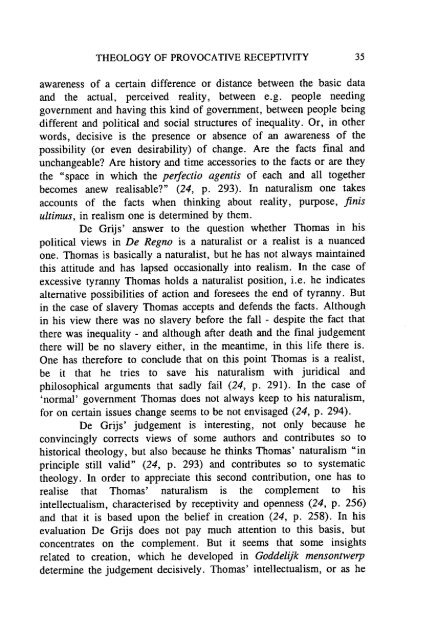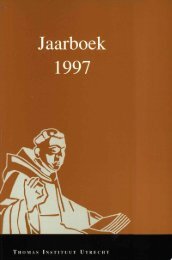Jaarboek Thomas Instituut 1995 - Thomas Instituut te Utrecht
Jaarboek Thomas Instituut 1995 - Thomas Instituut te Utrecht
Jaarboek Thomas Instituut 1995 - Thomas Instituut te Utrecht
Create successful ePaper yourself
Turn your PDF publications into a flip-book with our unique Google optimized e-Paper software.
THEOLOGY OF PROVOCATIVE RECEPTIVITY 35<br />
awareness of a certain difference or distance between the basic data<br />
and the actual, perceived reality, between e.g. people needing<br />
government and having this kind of government, between people being<br />
different and political and social structures of inequality. Or, in other<br />
words, decisive is the presence or absence of an awareness of the<br />
possibility (or even desirability) of change. Are the facts final and<br />
unchangeable? Are history and time accessories to the facts or are they<br />
the "space in which the perfectio agentis of each and all together<br />
becomes anew realisable?" (24, p. 293). In naturalism one takes<br />
accounts of the facts when thinking about reality, purpose, finis<br />
ultimus, in realism one is de<strong>te</strong>rmined by them.<br />
De Grijs' answer to the question whether <strong>Thomas</strong> in his<br />
political views in De Regno is a naturalist or a realist is a nuanced<br />
one. <strong>Thomas</strong> is basically a naturalist, but he has not always maintained<br />
this attitude and has lapsed occasionally into realism. In the case of<br />
excessive tyranny <strong>Thomas</strong> holds a naturalist position, i.e. he indica<strong>te</strong>s<br />
al<strong>te</strong>rnative possibilities of action and foresees the end of tyranny. But<br />
in the case of slavery <strong>Thomas</strong> accepts and defends the facts. Although<br />
in his view there was no slavery before the fall - despi<strong>te</strong> the fact that<br />
there was inequality - and although af<strong>te</strong>r death and the final judgement<br />
there will be no slavery either, in the meantime, in this life there is.<br />
One has therefore to conclude that on this point <strong>Thomas</strong> is a realist,<br />
be it that he tries to save his naturalism with juridical and<br />
philosophical arguments that sadly fail (24, p. 291). In the case of<br />
'normal' government <strong>Thomas</strong> does not always keep to his naturalism,<br />
for on certain issues change seems to be not envisaged (24, p. 294).<br />
De Grijs' judgement is in<strong>te</strong>resting, not only because he<br />
convincingly corrects views of some authors and contribu<strong>te</strong>s so to<br />
historical theology, but also because he thinks <strong>Thomas</strong>' naturalism "in<br />
principle still valid" (24, p. 293) and contribu<strong>te</strong>s so to sys<strong>te</strong>matic<br />
theology. In order to apprecia<strong>te</strong> this second contribution, one has to<br />
realise that <strong>Thomas</strong>' naturalism is the complement to his<br />
in<strong>te</strong>llectualism, charac<strong>te</strong>rised by receptivity and openness (24, p. 256)<br />
and that it is based upon the belief in creation (24, p. 258). In his<br />
evaluation De Grijs does not pay much at<strong>te</strong>ntion to this basis, but<br />
concentra<strong>te</strong>s on the complement. But it seems that some insights<br />
rela<strong>te</strong>d to creation, which he developed in Goddelijk mensontwerp<br />
de<strong>te</strong>rmine the judgement decisively. <strong>Thomas</strong>' in<strong>te</strong>llectualism, or as he








